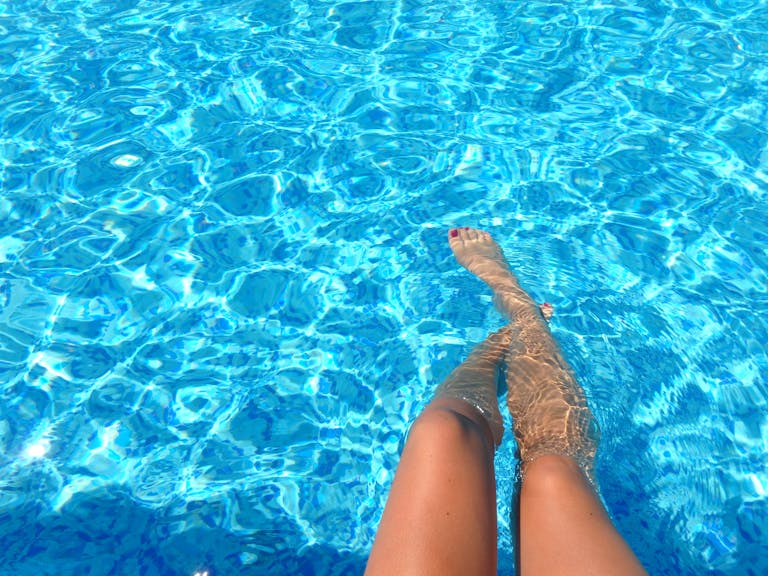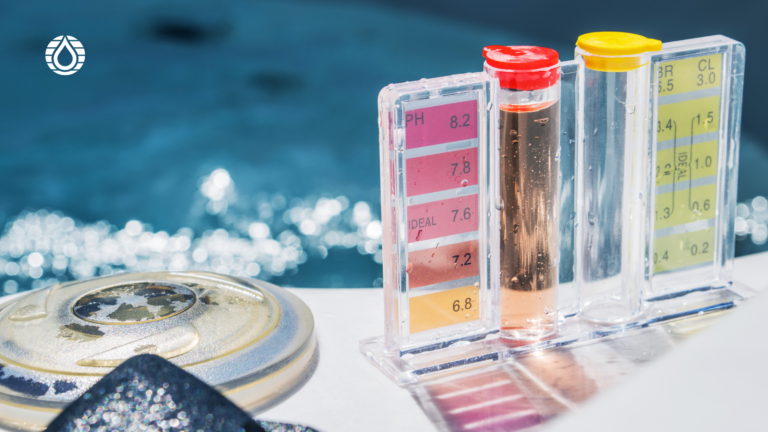How Heat and UV Rays Impact Your Pool’s Chemical Balance
Summer sunshine is great for swimming—but it can also wreak havoc on your pool water if you’re not careful. High temperatures and strong UV rays directly impact your pool’s chemical stability, making it more challenging to balance pool chemistry during the hottest months of the year.
If you’ve noticed your pool water turning cloudy, irritating your eyes, or developing an unusual smell, heat and sunlight might be the culprits. Here’s how they impact your pool and what you can do to stay ahead.
Chlorine Breakdown from UV Exposure
Chlorine is your pool’s primary defense against harmful bacteria and contaminants, but UV rays from the sun break down chlorine quickly, especially on hot, sunny days. Without enough chlorine, your pool becomes a breeding ground for algae and germs.
What to do: Use a stabilized chlorine product that includes cyanuric acid (CYA). However, too much CYA can bind the chlorine and prevent it from sanitizing the water. Ongoing chemical screenings from a professional pool management service provider can help balance the right amount of chlorine levels in your pool, to ensure you are doing the most for your pool.
Read: The Importance of Pool Water Chemistry
Algae Growth in Warm Water
Algae loves warm, stagnant water. If chlorine levels dip and circulation is poor, summer heat can trigger a rapid algae bloom, turning your pool green almost overnight.
What to do: Maintain proper circulation and filtration. To maintain proper circulation, you must clean the skimmer and pump baskets regularly and backwash and/or clean the filter. If you own a salt cell, you will need to clean this regularly since the calcium build-up reduces chlorine production.
Increased Swimmer Load Adds Contaminants
Summer means more swimmers, more sunscreen, and more debris—all of which affect chemical balance. Body oils, lotions, and organic matter put extra stress on your pool’s sanitizer.
What to do: Encourage pre-swim rinses and maintain a consistent pool maintenance schedule. Adding enzymes to your pool can also help break down swimmer waste.
Chemical Imbalance Leads to Irritation
Have you noticed a pungent chlorine smell lately? You may have an increase in chloramines. Warm water increases chloramines, which is why swimmers often experience red eyes and itchy skin.
What to do: Regularly monitor and adjust pH, chlorine, and alkalinity levels. A properly balanced pool should feel comfortable and smell fresh.
Read: How Dirty Is Too Dirty? 6 Gross Pool Problems You Shouldn’t Ignore
Don’t Sweat It, Leave Pool Chemistry to the Pros
Balancing pool chemistry in the summer is a full-time job. With heat, UV rays, and constant use affecting your water daily, it’s easy to fall behind. If you’re tired of guessing at chemical levels or fighting off green water, it’s time to consider hiring professionals. At Round Rock Pool Pros, we take the stress out of pool maintenance with expert water testing, chemical balancing, and reliable service all summer long.
Contact Round Rock Pool Pros today and let us handle the science, so you can get back to enjoying the water.







